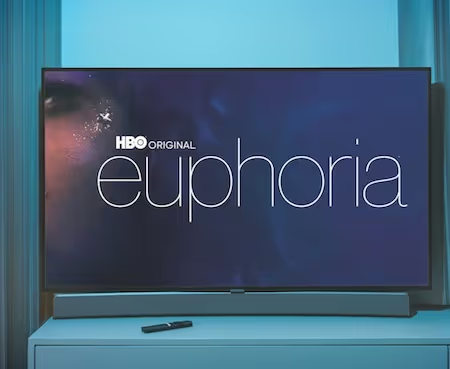


How do we get our kids and students to talk with us about the “TV shows” they watch productively? (I put TV in quotes since so often shows are watched on many types of personal devices.) I had to work hard on this because often my teens would cringe when I entered the room when they were watching some popular show on a screen. They felt really judged by me and having any conversations were then fraught with tension. Fortunately, I saw that this approach was not furthering my goal of helping them gain greater media awareness. So I have made two successful changes in how I approach my kids about the shows they are watching, and I wanted to share my advice:
First: Use research when you talk to your kids. Data is not judgemental. I have a good study to share here. Before you discuss the study, ask your kids what they think are the most represented values in popular shows? In this study psychologist Patricia Greenfield and her team analyzed the two most popular television shows with tweens (kids ages 9-11) and the top values depicted on the shows every decade from 1967 to 2007. Sixty raters ages 18 to 59 watched the shows and marked how often certain values were portrayed.
Here is the take home from the study: “Fame, an individualistic value, was judged the top value from the shows of 2007, up from number fifteen (out of sixteen) in most of the prior decades. In contrast, community feeling was eleventh in 2007, down from first or second place in all prior decades.”
Ask your kids why they think community feeling sank while the individualistic value of fame rose. I recognize this particular data is from 2007, so maybe try identifying what the top values are that you notice in shows you’ve watched this year.
Second: I try to watch a show with my kids now and then and keep my mouth shut through the whole show—I usually fail a bit and blurt out something like “Oh that would never happen” and then quickly kick myself and reapply my metaphorical duct tape. Then, I wait for a day or two and say something positive about the show. For example, for the show “How I Met Your Mother” I might say something like, “It’s amazing how they come up with so many jokes one right after the other.” What I really want to say is “Have you noticed that every other joke seems to be about sex,” but I hold back. They already know that I feel that way and that is why they are defensive about all these shows and my co-viewing. But they also know that I work hard to see things from many perspectives, so they are willing to engage with me….if I am thoughtful in how I am approaching things.
From this place of positivity, I then might ask what they like about the show? What seems true to life and what seems untrue? This approach has made our talks go much smoother.
Learn more about showing our movies in your school or community!
Join Screenagers filmmaker Delaney Ruston MD for our latest Podcast

Learn more about our Screen-Free Sleep campaign at the website!
Our movie made for parents and educators of younger kids
Learn more about showing our movies in your school or community!
Learn more about showing our movies in your school or community!
Join Screenagers filmmaker Delaney Ruston MD for our latest Podcast

Learn more about our Screen-Free Sleep campaign at the website!
Our movie made for parents and educators of younger kids
Join Screenagers filmmaker Delaney Ruston MD for our latest Podcast
As we’re about to celebrate 10 years of Screenagers, we want to hear what’s been most helpful and what you’d like to see next.
Please click here to share your thoughts with us in our community survey. It only takes 5–10 minutes, and everyone who completes it will be entered to win one of five $50 Amazon vouchers.
How do we get our kids and students to talk with us about the “TV shows” they watch productively? (I put TV in quotes since so often shows are watched on many types of personal devices.) I had to work hard on this because often my teens would cringe when I entered the room when they were watching some popular show on a screen. They felt really judged by me and having any conversations were then fraught with tension. Fortunately, I saw that this approach was not furthering my goal of helping them gain greater media awareness. So I have made two successful changes in how I approach my kids about the shows they are watching, and I wanted to share my advice:
First: Use research when you talk to your kids. Data is not judgemental. I have a good study to share here. Before you discuss the study, ask your kids what they think are the most represented values in popular shows? In this study psychologist Patricia Greenfield and her team analyzed the two most popular television shows with tweens (kids ages 9-11) and the top values depicted on the shows every decade from 1967 to 2007. Sixty raters ages 18 to 59 watched the shows and marked how often certain values were portrayed.
Here is the take home from the study: “Fame, an individualistic value, was judged the top value from the shows of 2007, up from number fifteen (out of sixteen) in most of the prior decades. In contrast, community feeling was eleventh in 2007, down from first or second place in all prior decades.”
Ask your kids why they think community feeling sank while the individualistic value of fame rose. I recognize this particular data is from 2007, so maybe try identifying what the top values are that you notice in shows you’ve watched this year.
Second: I try to watch a show with my kids now and then and keep my mouth shut through the whole show—I usually fail a bit and blurt out something like “Oh that would never happen” and then quickly kick myself and reapply my metaphorical duct tape. Then, I wait for a day or two and say something positive about the show. For example, for the show “How I Met Your Mother” I might say something like, “It’s amazing how they come up with so many jokes one right after the other.” What I really want to say is “Have you noticed that every other joke seems to be about sex,” but I hold back. They already know that I feel that way and that is why they are defensive about all these shows and my co-viewing. But they also know that I work hard to see things from many perspectives, so they are willing to engage with me….if I am thoughtful in how I am approaching things.
From this place of positivity, I then might ask what they like about the show? What seems true to life and what seems untrue? This approach has made our talks go much smoother.
Sign up here to receive the weekly Tech Talk Tuesdays newsletter from Screenagers filmmaker Delaney Ruston MD.
We respect your privacy.
How do we get our kids and students to talk with us about the “TV shows” they watch productively? (I put TV in quotes since so often shows are watched on many types of personal devices.) I had to work hard on this because often my teens would cringe when I entered the room when they were watching some popular show on a screen. They felt really judged by me and having any conversations were then fraught with tension. Fortunately, I saw that this approach was not furthering my goal of helping them gain greater media awareness. So I have made two successful changes in how I approach my kids about the shows they are watching, and I wanted to share my advice:
First: Use research when you talk to your kids. Data is not judgemental. I have a good study to share here. Before you discuss the study, ask your kids what they think are the most represented values in popular shows? In this study psychologist Patricia Greenfield and her team analyzed the two most popular television shows with tweens (kids ages 9-11) and the top values depicted on the shows every decade from 1967 to 2007. Sixty raters ages 18 to 59 watched the shows and marked how often certain values were portrayed.
Here is the take home from the study: “Fame, an individualistic value, was judged the top value from the shows of 2007, up from number fifteen (out of sixteen) in most of the prior decades. In contrast, community feeling was eleventh in 2007, down from first or second place in all prior decades.”
Ask your kids why they think community feeling sank while the individualistic value of fame rose. I recognize this particular data is from 2007, so maybe try identifying what the top values are that you notice in shows you’ve watched this year.
Second: I try to watch a show with my kids now and then and keep my mouth shut through the whole show—I usually fail a bit and blurt out something like “Oh that would never happen” and then quickly kick myself and reapply my metaphorical duct tape. Then, I wait for a day or two and say something positive about the show. For example, for the show “How I Met Your Mother” I might say something like, “It’s amazing how they come up with so many jokes one right after the other.” What I really want to say is “Have you noticed that every other joke seems to be about sex,” but I hold back. They already know that I feel that way and that is why they are defensive about all these shows and my co-viewing. But they also know that I work hard to see things from many perspectives, so they are willing to engage with me….if I am thoughtful in how I am approaching things.
From this place of positivity, I then might ask what they like about the show? What seems true to life and what seems untrue? This approach has made our talks go much smoother.

Many young people and adults love horror films and talk about how they love the feeling of being scared. This is so very different from me. I am not at all a fan. This week I have been thinking about ways to talk with kids about when horror in movies, TV shows, and online, in general, go too far.
READ MORE >
The Screenagers’ Tech Talk Tuesday blog from two weeks ago provided four questions for teens to answer regarding the HBO show Euphoria. As intended, the questions sparked conversations among adults and teens, and we got many thoughtful answers from teens in the questionnaire.
READ MORE >
I find HBO’s Euphoria incredibly disturbing and know that although so many of our kids have watched it, many parents never have. Today, I offer a way into a conversation with youth about the show’s topics and popularity.
READ MORE >for more like this, DR. DELANEY RUSTON'S NEW BOOK, PARENTING IN THE SCREEN AGE, IS THE DEFINITIVE GUIDE FOR TODAY’S PARENTS. WITH INSIGHTS ON SCREEN TIME FROM RESEARCHERS, INPUT FROM KIDS & TEENS, THIS BOOK IS PACKED WITH SOLUTIONS FOR HOW TO START AND SUSTAIN PRODUCTIVE FAMILY TALKS ABOUT TECHNOLOGY AND IT’S IMPACT ON OUR MENTAL WELLBEING.
